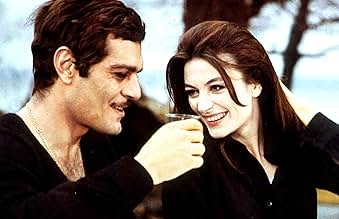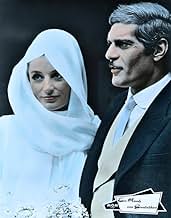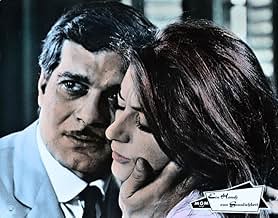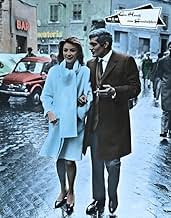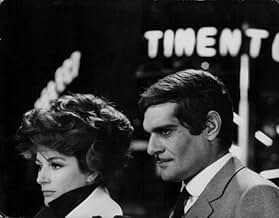The lawyer Federico Fendi has reasons to believe that his wife Carla in secret is Rome's highest paid prostitute.The lawyer Federico Fendi has reasons to believe that his wife Carla in secret is Rome's highest paid prostitute.The lawyer Federico Fendi has reasons to believe that his wife Carla in secret is Rome's highest paid prostitute.
- Awards
- 1 nomination total
Gigi Proietti
- Fabre
- (as Luigi Proietti)
Ermelinda De Felice
- Fishmonger's Wife
- (as Linda De Felice)
Gabriella Boccardo
- Anna
- (as Gabriella Grimaldi)
- Director
- Writers
- All cast & crew
- Production, box office & more at IMDbPro
Featured reviews
...this movie deserves a DVD release. I saw it on TV(missed the opening credits) years ago and years after its theatrical release. I had to call a friend to find out who this "European" director was. Surprise--Lumet? Still, I found the ambiguities and open-endedness intriguing. Glacial pacing? Bad acting? I've seen worse. Cinematography and narrative arc were unusual for an American director. The beautiful Anouk Aimée is always eminently watchable and for that alone we should be able to watch this again. Anyone out there have the wherewithal to get this out on DVD? I'm sure others would like to give this one another go and reconsider their opinions.
Drawn into the movie for the sheer enjoyment of watching Sharif - I became immediately swept up in it. Viewers are coaxed gently into the storyline, and it succeeds in drawing you in as you yearn for more. There is a subtle quality of this film that resonates. What is not said with dialog becomes even more important than the actual conversations. We long to know what is behind those eyes, both of theirs - the hurt, the desire, the fear. The film works, in stumbling ways at times, but overall it is memorable, thought provoking and well done. I absolutely loved it, flaws and all. Sharif was well cast, his performance was brilliantly restrained, he held back and became a very believable character. His eyes are so amazing, and so important to see the heart of this character. Aimee is of course lovely, and her Carla is a tortured beautiful soul. I felt both actors were well matched and their seemingly awkward tendencies together made them all the more real. I look forward to watching it again to uncover more of it's intricate layers. Bravo!
Anyone familiar with Sidney Lumet's best work (Serpico, Dog Day Afternoon, Network, etc.) will know of his meticulous attention to character depth and plot detail. The Appointment has none of this. Rather than tell a story, Lumet instead takes his shot at making a stylish Europeanish sort of art film complete with sullen close-ups, high-angle shots and carefully constructed compositions- perhaps just to see if he could do it. Some of it comes off rather well- I liked the longshot of Omar Sharif trudging dutifully away down a hospital corridor while two nuns hurry in the other direction, and a sequence at a fashion show that features a cluster of models dashing in and out in various costume changes and hair styles including one in the flapping and swaying of butterflies is almost worthy of Fellini. Almost. On the other hand, a shot of the two lovers in a field pulled back and upward into the high distance until the couple is drowned out by the island they're on goes on too long and is less effective. I wonder what Lumet is trying to accomplish there by obscuring the lovers and placing the entirety of the island squarely within the picture frame.
There is very little dialogue in the film; everything is inferred and gently disturbing. I think Sharif and Anouk Aimee are fine in their roles, but what is a little off-putting is the coldness and sterility of the affair and their movements, even during passionate scenes. When the tragic moment occured toward the end, I felt nothing. I give Lumet an A for effort and I must admit I was fascinated by the whole thing but fascination doesn't neccessarily equal enjoyment. This movie puts me in mind of Woody Allen's Interiors for all its emotional distance. And as Woody himself once said about Interiors, "it's an interesting failure."
There is very little dialogue in the film; everything is inferred and gently disturbing. I think Sharif and Anouk Aimee are fine in their roles, but what is a little off-putting is the coldness and sterility of the affair and their movements, even during passionate scenes. When the tragic moment occured toward the end, I felt nothing. I give Lumet an A for effort and I must admit I was fascinated by the whole thing but fascination doesn't neccessarily equal enjoyment. This movie puts me in mind of Woody Allen's Interiors for all its emotional distance. And as Woody himself once said about Interiors, "it's an interesting failure."
This film is very difficult to see, but I managed to on TCM and was glad I did. Not that its all that good, but I found it worthwhile just because it was so very unusual for its director. Like others have commented, if you saw this with no knowledge who made it, I don't believe anyone would be able to guess Sidney Lumet was the director. This is a completely European film in style and content. Some beautiful cinematography and lovely Italian locations are the main recommendations, also a supporting performance by Lotte Lenya as a procuress. Her character is not all that evil, despite her admission that she was a fascist and supporter of Mussolini, but no other actress could so effortlessly bring a touch of the sinister than Lenya did just by showing up. The main problem with Sharif and Aimee is that, other than not being the most expressive of actors (though they sure look good), their characters just plain do not act like real people would - they both seem damaged and the screenplay makes them behave in ways that make one long to slap them both. Still, I enjoyed the leisurely pace and 60's fashions and ambiance enough to be glad of the opportunity to see this warped love story.
Considering the film was made in 1969, the film is interesting in its approach to subjects, camerawork, acting, etc. Lumet being an American was making a European film in style and content. Some of the camerawork along the streets of Rome reminds you of Boorman's "Point Blank" (1967) or Goddard's "Alphaville" (1965). It has a pointless helicopter shot of the lovers in embrace in an open field which six years later was used with great elan by Arthur Penn in another existential story "Night Moves" as the final shot in that movie. The film has no semblance to the typical Hollywood cinema of late sixties; it is closer to European cinema which Boorman was able to capture quite effectively with existential dilemmas presented on screen. Lumet went on to make much more memorable films, one of which was "Equus".
The story of a doubting lover, a jealous husband has been presented on screen several times. It is an Othello story retold. Omar Sharif's lead role appears plausible but he seems to overdo every detail. His cigarette smoking scene was meant to be a picture of nervousness--yet he is rarely seen smoking during the course of the film. Lumet seems to overlook details. Or is he teasing you?
Anouk Aimee is great to watch because she is so good looking not because she acts well--at least she is not convincing in this film. What is her relationship with the young man on the island? Lumet makes us wonder with the meaningful shot of the man's face on the second trip of the couple to the island. We are left guessing about Aimee's true character even after the end. Everything is open ended, except for the Othello-like lead character. Probably this was the reason for the film being nominated for the Golden Palm at Cannes. Lumet succeeds in fleshing out the male character, but fumbles with the female lead character. Perhaps it was his intention to leave us guessing.
The film remains a puzzle, a good effort that pales in comparison to Lumet's better works like "Equus", "12 Angry Men" and "the Verdict".
The story of a doubting lover, a jealous husband has been presented on screen several times. It is an Othello story retold. Omar Sharif's lead role appears plausible but he seems to overdo every detail. His cigarette smoking scene was meant to be a picture of nervousness--yet he is rarely seen smoking during the course of the film. Lumet seems to overlook details. Or is he teasing you?
Anouk Aimee is great to watch because she is so good looking not because she acts well--at least she is not convincing in this film. What is her relationship with the young man on the island? Lumet makes us wonder with the meaningful shot of the man's face on the second trip of the couple to the island. We are left guessing about Aimee's true character even after the end. Everything is open ended, except for the Othello-like lead character. Probably this was the reason for the film being nominated for the Golden Palm at Cannes. Lumet succeeds in fleshing out the male character, but fumbles with the female lead character. Perhaps it was his intention to leave us guessing.
The film remains a puzzle, a good effort that pales in comparison to Lumet's better works like "Equus", "12 Angry Men" and "the Verdict".
Did you know
- TriviaThe film was first envisaged as a starring vehicle for Marcello Mastroianni and Kim Novak with Frank Perry directing.
- Quotes
Old Woman on Train: I am not old. I am not old. I am just lived for a long time.
- Alternate versionsThe film was not released theatrically in the U.S., but was aired on CBS at 11:30 p.m. on July 20, 1972, in a re-edited, shorter version, with a new score by 'Stu Phillips (I)'.
- ConnectionsFeatured in Legends of World Cinema: Anouk Aimée
- How long is The Appointment?Powered by Alexa
Details
- Runtime
- 1h 55m(115 min)
- Sound mix
- Aspect ratio
- 1.85 : 1
Contribute to this page
Suggest an edit or add missing content

